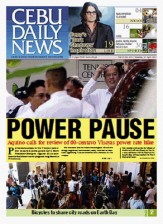Aquino calls for review of 60-centavo Visayas power rate hike

The President said the Palace and Congress will ask the Energy Regulatory Commission (ERC) to revisit its decision approving a 60.60-centavo rate increase in the Visayas.
“We are not sure if the rate increases are warranted,” Aquino told delegates of the 17th World Electronics Forum held in Mactan.
“Congress first, then also the Executive (branch) will be making appropriate representations with the ERC to review this particular decision.”
The President said he was aware that the price of electricity in the Philippines is a major deterrent to further investments.
The 60.60-centavo-per-kilowatt-hour rate increase for the Visayas was approved by the ERC last March 29 and will take effect next month. The current power rate for the Visayas is pegged at P4.0740 per kilowatt hour.
Article continues after this advertisementLuzon, which received a 69-centavo rate increase, currently charges the highest rate or P5.0160 per kilowatt hour.
Article continues after this advertisementMindanao, most of which is plagued by hours-long brownouts, will add 42 centavos to its P2.9321 per kilowatt hour rate.
The actual impact of a power rate hike on households, and commercial and industrial customers in Cebu will be known later this month.
“We don’t have the amount of the actual increase yet since Napocor still has to bill us at the end of the month,” said Ethel Natera, public information manager of the Visayan Electric Company (Veco) in a text message to Cebu Daily News.
With President Aquino’s announcement, Natera said Veco will just wait for an order from the ERC if the private utility should proceed with applying the rate increase as pass-on cost to consumers next month.
Veco’s franchise area covers Metro Cebu, has a peak demand of 407 MW and serves 327,587 customers from Liloan town in the north to San Fernando in the south.
About 30 percent of power distributed by Veco comes from the National Power Corp.
Other distribution utilities in Cebu include the Mactan Electric Co. and Cebu Electric Cooperative for rural areas and other parts of Mactan Island.
Cebu Business Club president Gordon Allan Joseph said increasing electricity costs should be avoided.
“Everyone knows the government has been subsidizing Napocor and that appears to be unsustainable. It is now incumbent upon the government to seek more solutions to the high cost of power far more aggressively than they have been. We cannot afford a cost of power that only spirals upwards. It’s bad for business.
SHORT TERM
Aquino last week told stakeholders in the Mindanao power industry that consumers there have to pay a little more in exchange for a steady and sustainable supply of electricity. Mindanao has been in the grip of brownouts because of limited power supply in recent weeks.
Aquino indicated that the ERC review was the short-term approach to the increase in power rates in the Visayas. He also expressed support for amendments to the Energy and Power Industry Reform Act.
“The law that created the ERC is about 10 years old. It is actually the subject of various proposed amendments and has not yet achieved the start of the wholesale electronic spot market, which is supposed to actually bring down the prices of electricity,” the President said.
“We are trying to accelerate that whole process. We are also encouraging more power-generating companies to set up their plants,” he added.
His administration believes that an increase in the number of power producers would drive down the price of electricity. It has proposed increased private sector participation as a solution to recurring power shortages in Mindanao in recent weeks.
“We have changed the way power is generated in this country. I’m not happy with the pace (of improvements in the power industry) … so we will accelerate that process,” the President said.
INVESTMENT IMPACT
“We are cognizant of the fact that the price of electricity in this country is a major deterrent to further investments and we are trying to accelerate the process where the benefits under the Epira law will be realized the soonest so that we can have a more competitive electricity rate structure within the country,” the President told the electronics stakeholders.
A recent World Bank report cited high power rates as one of the reasons economic gains made by the Aquino administration have yet to be fully felt by most Filipinos.
While indicating support for the privatization of power assets in Mindanao as mandated by the Epira, Mr. Aquino also said that the executive branch was in favor of reviewing the Epira. He said a council of stakeholders would have to review the rate increases to ensure that they remain reasonable.
In an energy summit held in Davao City last week, Aquino said the private sector should step up to ensure steady and sustainable supply of electricity.
In the case of Mindanao, Aquino said while an increase in power rates is necessary, a council made up of stakeholders should ensure that these remain reasonable. INQUIRER and Reporter Aileen Garcia-Yap